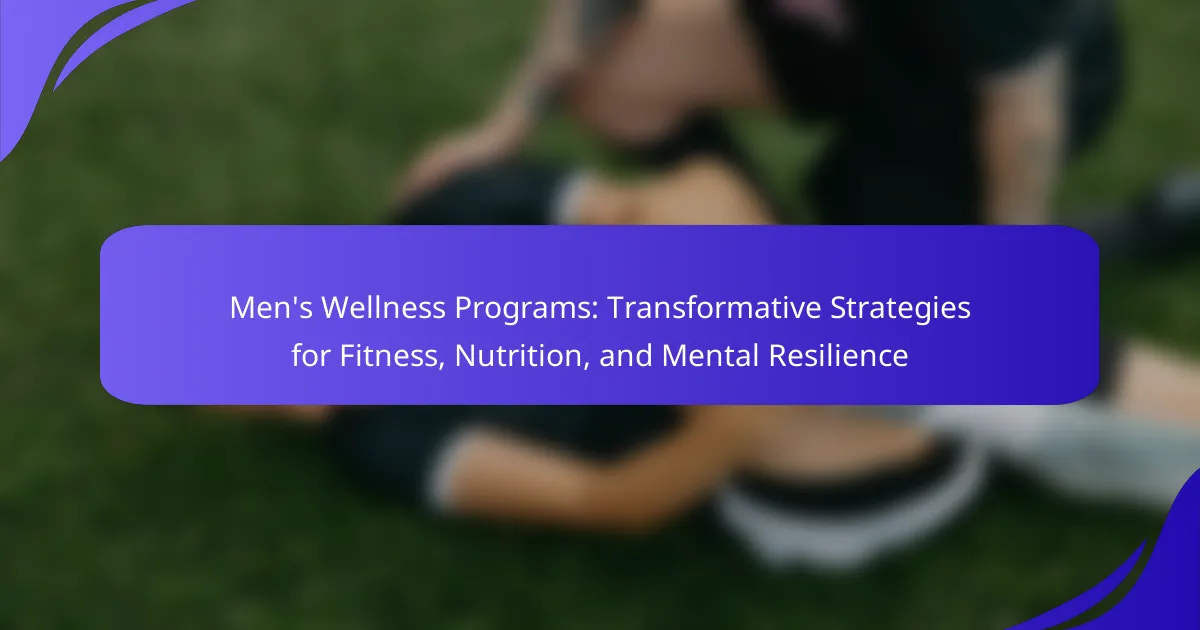Men’s wellness programs enhance overall health by integrating fitness, nutrition, and mental resilience. They focus on personalised strategies, community support, and regular assessments. These programs foster sustainable habits, improve energy levels, and reduce stress, leading to long-term well-being. Unique approaches like technology integration and mindfulness practices further enhance effectiveness and engagement.

What are the key components of men’s wellness programs?
Men’s wellness programs focus on fitness, nutrition, and mental resilience. Key components include physical activity routines, balanced meal plans, stress management techniques, and community support. These elements foster holistic health, enhancing overall well-being. Regular assessments track progress and adjust strategies, ensuring continuous improvement.
How do fitness strategies impact overall wellness?
Fitness strategies significantly enhance overall wellness by integrating physical activity, nutrition, and mental resilience. These programs promote physical health, improve mood, and foster social connections. For instance, regular exercise boosts cardiovascular health and reduces stress. Nutrition education helps in making informed dietary choices, leading to better energy levels and weight management. Mental resilience training equips individuals with coping mechanisms, enhancing emotional well-being. Collectively, these elements create a holistic approach to men’s wellness, positively impacting both physical and mental health.
What nutritional approaches enhance men’s health?
Balanced nutrition, regular exercise, and mental health practices significantly enhance men’s health. Key nutritional approaches include a diet rich in whole foods, lean proteins, healthy fats, and plenty of fruits and vegetables. These components support physical fitness and mental resilience.
Incorporating omega-3 fatty acids, found in fish and flaxseeds, has unique benefits for heart health and cognitive function. Adequate hydration and limiting processed sugars are rare attributes that contribute to overall wellness.
Regular meal patterns, such as eating smaller, more frequent meals, can stabilise energy levels and improve metabolism. As a result, men experience better physical performance and mental clarity.
Engaging in mindful eating practices fosters a healthier relationship with food, further enhancing mental resilience. These strategies collectively empower men to achieve optimal health outcomes.
Why is mental resilience crucial in wellness programs?
Mental resilience is crucial in wellness programs because it enhances individuals’ ability to cope with stress and challenges. This attribute fosters a growth mindset, enabling participants to adapt and thrive in their fitness and nutrition journeys. Studies indicate that individuals with high mental resilience experience lower levels of anxiety and depression, which positively impacts their overall wellness. By integrating mental resilience training into men’s wellness programs, participants can achieve sustainable lifestyle changes that promote long-term health and well-being.

What universal benefits do men’s wellness programs offer?
Men’s wellness programs offer universal benefits such as improved physical fitness, enhanced mental health, and better nutritional habits. These programs focus on holistic approaches, addressing both body and mind. Participants often experience increased energy levels, reduced stress, and a sense of community. As a result, they develop sustainable habits that promote long-term well-being.
How do these programs improve physical fitness?
Men’s wellness programs enhance physical fitness through structured exercise, nutrition guidance, and mental resilience techniques. These programs promote regular physical activity, leading to increased strength and endurance.
Additionally, tailored nutrition plans improve energy levels and support muscle recovery. Mental resilience training fosters a positive mindset, enhancing motivation and commitment to fitness goals.
Research indicates that participants in men’s wellness programs experience significant improvements in overall health metrics, including body composition and cardiovascular fitness. Regular engagement in these programs can lead to sustainable lifestyle changes, ultimately transforming physical fitness and well-being.
What role does nutrition play in enhancing energy levels?
Nutrition is crucial for enhancing energy levels, as it provides the essential nutrients that fuel bodily functions. A balanced diet rich in carbohydrates, proteins, and healthy fats supports sustained energy release. For example, complex carbohydrates from whole grains offer a steady supply of energy, while proteins aid in muscle repair and recovery. Adequate hydration is also vital, as even mild dehydration can lead to fatigue. Incorporating nutrient-dense foods, such as fruits and vegetables, contributes to improved vitality and overall wellness.
How can mental resilience lead to better stress management?
Mental resilience enhances stress management by equipping individuals with coping strategies. These strategies enable better emotional regulation and problem-solving during challenging situations. Research indicates that resilient individuals experience lower stress levels and improved overall well-being. By participating in men’s wellness programs, individuals can develop mental resilience through targeted activities, fostering a proactive approach to stress. Such programs often include mindfulness practices, physical fitness, and nutritional guidance, all contributing to a holistic improvement in mental health.

What unique strategies differentiate effective wellness programs?
Effective wellness programs for men differentiate themselves through personalised strategies that address fitness, nutrition, and mental resilience. Tailoring approaches to individual needs enhances engagement and outcomes.
Unique strategies include integrating technology for tracking progress, fostering community support through group activities, and emphasising mental health alongside physical fitness. For instance, programs that incorporate mindfulness practices show improved mental resilience.
Additionally, evidence-based nutrition plans that adapt to changing health needs contribute significantly to overall wellness. Regular assessments ensure programs remain relevant and effective.
Incorporating these transformative strategies leads to sustainable lifestyle changes, enhancing men’s overall health and well-being.
How does personalised coaching influence outcomes?
Personalised coaching significantly enhances outcomes in men’s wellness programs by tailoring strategies to individual needs. This customised approach improves fitness, nutrition, and mental resilience, leading to higher adherence and motivation. Studies show that participants in personalised coaching programs experience a 30% increase in goal achievement compared to generic programs. Additionally, coaching fosters accountability, which is a unique attribute that drives sustained lifestyle changes. As a result, men report greater satisfaction and improved overall well-being.
What innovative technologies are used in tracking progress?
Innovative technologies used in tracking progress in men’s wellness programs include wearable devices, mobile applications, and AI-driven analytics. Wearable devices like fitness trackers monitor physical activity, heart rate, and sleep patterns, providing real-time data. Mobile applications facilitate goal setting and nutrition tracking, enhancing user engagement. AI-driven analytics offer personalised feedback based on collected data, improving overall program effectiveness. These technologies support fitness, nutrition, and mental resilience by providing actionable insights and fostering accountability.

What rare attributes can enhance the effectiveness of these programs?
Incorporating rare attributes can significantly enhance the effectiveness of men’s wellness programs. Unique approaches such as personalised coaching, biofeedback mechanisms, and integrative health assessments create tailored experiences. These attributes foster deeper engagement and accountability, leading to improved outcomes. Programs that include community support networks and gamification elements also promote sustained participation. Lastly, leveraging technology for real-time health tracking can provide valuable insights into individual progress, enhancing motivation and results.
What role does community support play in success?
Community support is crucial for success in men’s wellness programs. It fosters accountability, motivation, and shared experiences among participants. Engaging with others enhances commitment to fitness, nutrition, and mental resilience, creating a sense of belonging. Programs that incorporate community elements report higher retention rates and improved outcomes. For example, group challenges or workshops can lead to better adherence to health goals. This unique attribute of community involvement significantly amplifies individual progress and overall program effectiveness.
How can holistic approaches improve engagement?
Holistic approaches enhance engagement by integrating fitness, nutrition, and mental resilience into Men’s Wellness Programs. These strategies foster a sense of community, promote accountability, and encourage sustainable lifestyle changes. For instance, group activities increase social interaction, leading to higher motivation levels. Additionally, personalised nutrition plans address unique dietary needs, improving overall health and well-being. Mental resilience training equips participants with coping strategies, enhancing their commitment to the program. Overall, these elements create a supportive environment that significantly boosts participant engagement and success.

What are the common pitfalls in men’s wellness programs?
Men’s wellness programs often fail due to common pitfalls that hinder their effectiveness. Lack of personalisation is a major issue, as one-size-fits-all approaches do not address individual needs. Inadequate support systems can lead to diminished motivation, making it essential to include community or professional guidance. Additionally, neglecting mental health aspects reduces overall program success, as mental resilience is crucial for lasting change. Lastly, failure to track progress can obscure results, making it difficult to adjust strategies effectively.
What mistakes should be avoided when setting fitness goals?
To avoid mistakes when setting fitness goals, focus on specificity, realism, and adaptability. Common errors include setting vague goals, such as “get fit,” instead of measurable targets like “run 5 kilometres in under 30 minutes.” Unrealistic expectations can lead to frustration; ensure goals are achievable based on current fitness levels. Additionally, neglecting to adjust goals as progress occurs can hinder motivation. Regularly reassess and modify your objectives to maintain engagement and promote continuous improvement.
How can poor nutrition choices derail progress?
Poor nutrition choices can significantly hinder progress in men’s wellness programs by affecting physical performance, mental clarity, and overall health. Inadequate nutrient intake can lead to decreased energy levels, making it challenging to maintain workout intensity and consistency. For instance, a diet lacking essential vitamins and minerals can impair muscle recovery, increasing the risk of injury.
Moreover, poor dietary habits can contribute to weight gain, which negatively impacts fitness goals. Studies show that men who prioritise balanced nutrition are more likely to achieve sustainable weight loss and improved body composition. Additionally, suboptimal nutrition can lead to mental fatigue and decreased motivation, undermining the mental resilience necessary for long-term success in fitness programs.
In conclusion, making informed nutrition choices is crucial for maximising the benefits of fitness and mental resilience strategies within men’s wellness programs.
What are the signs of mental fatigue that participants should watch for?
Signs of mental fatigue include persistent tiredness, difficulty concentrating, irritability, and decreased motivation. Participants should also watch for disrupted sleep patterns and increased anxiety. Recognising these signs is essential for maintaining mental resilience in wellness programs. Addressing mental fatigue can enhance overall performance in fitness and nutrition activities.

What actionable tips can enhance participation in wellness programs?
To enhance participation in men’s wellness programs, focus on personalised engagement strategies. Create tailored fitness plans that address individual goals, preferences, and fitness levels. Foster a supportive community through group activities and challenges, encouraging camaraderie and accountability. Utilise technology, such as apps and wearables, to track progress and maintain motivation. Offer educational workshops on nutrition and mental resilience to empower participants with knowledge and skills.
How can individuals set realistic and achievable goals?
Individuals can set realistic and achievable goals by following a structured approach. Start by identifying specific areas of focus within men’s wellness programs, such as fitness, nutrition, or mental resilience. Break down larger goals into smaller, manageable steps. For example, instead of aiming to lose 20 pounds, set a target to lose 2 pounds per week. Regularly assess progress and adjust goals as needed to maintain motivation and alignment with personal wellness objectives. Focus on establishing a support system through community engagement or professional guidance to enhance accountability and success.
What are the best practices for maintaining motivation?
To maintain motivation in men’s wellness programs, set clear, achievable goals. Break larger objectives into smaller milestones for a sense of accomplishment. Regularly track progress to stay engaged and adjust strategies as needed. Incorporate social support by joining groups or finding workout partners. Celebrate successes to reinforce positive behaviour and commitment.
How can regular assessments improve program effectiveness?
Regular assessments enhance program effectiveness by identifying strengths and weaknesses in Men’s Wellness Programs. They facilitate tailored adjustments to fitness, nutrition, and mental resilience strategies. This proactive approach ensures participants remain engaged and motivated, ultimately improving overall outcomes. Consistent evaluation fosters accountability and allows for data-driven decisions, leading to optimised program delivery and participant satisfaction.



